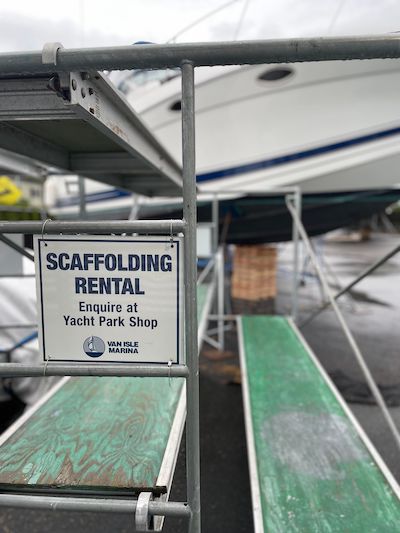A Guide to Waxing and Painting your Boat
How to Get Your Yacht Shining Like New Again
There is nothing more pleasurable than sailing on a sunny day in a boat that’s sparkling like new. Unfortunately, we all know that UV rays and salt water can take their toll on your boat’s shiny finish over time, but regularly waxing or painting your boat can help retain that ‘like new’ finish.
While refinishing your boat can be time-consuming, expensive and even a bit tricky, the results are definitely worth it. Our guide to waxing and painting your boat will help you decide which is the best option for your vessel and take you through the process step-by-step for each.
Why Do I Need To Wax Or Paint My Boat?
Most new fiberglass boats are finished with a protective gelcoat which starts off shiny and smooth. Over time, this gelcoat layer gets damaged by exposure to the sun and saltwater causing:
- Discolouration
- Cloudiness or chalkiness
- Dullness
- Fine scratches
Waxing or painting your boat will remove this damage and restore your yacht’s shine. Regular waxing also protects the hull and topside by sealing the surface, therefore preventing water stains.
Wax Or Paint – Which Does My Boat Need?
Ultimately, the type of boat you have, its age and the level of damage will be your guide as to whether a polish and wax or a paint job is required. For example:
Polishing and Waxing:
- Polishing and waxing regularly will help restore and maintain your boat and protect it for the boating season
- In most cases, some polishing of the gelcoat will be required before wax is applied
- Polishes contain abrasive compounds which will remove some of the old gelcoat and reduce oxidation, cloudiness, small scratches. Polishing is usually done using a mechanical buffer
- Wax is then used to protect and seal the gelcoat and repel water and UV rays
- Wax can be applied directly over a gelcoat which is in good condition with no scratches or damage
Painting:
- Sometimes the gelcoat gets worn too thin by years of polishing and waxing – in this case, painting is the best option for a ‘like new’ refresh.
- Painting is a more time-consuming and expensive job; but once done, the finish will last for a long time, especially if maintained with regular wax coatings.
If you are unsure about what treatment your boat needs, always consult with an expert at Van Isle Marina’s world-class Yacht Park. While we do not offer topside painting or waxing services, we do specialize in anti-fouling services, including:
- Seasonal application of new anti-fouling including wet sand surface prep
- Prepping new boats for service in saltwater. Marking waterlines and applying epoxy barrier coatings
- Sandblasting and stripping old anti-fouling
- Changing zincs
- Polishing running gear

We also rent scaffolding for anyone who wants to complete this work themselves or have a third party come in and complete these services.
Top Tips For DIY Boat Waxing
Experts suggest waxing your boat at least once a year, although many people like to do it twice – at both the start and end of each boating season.
Step 1 – Clean, Clean, Clean! Use an environmentally-friendly boat wash to ensure all salt, dirt, mould, grime and stains are removed.
Step 2 – Polish to restore the gelcoat layer. Depending on the level of damage, different polishing techniques may be required including wet polishing or rubbing compounds.
Step 3 – Wax on! Apply thin layers of wax coating to seal and protect the polished gelcoat. Wax options include:
- Carnauba wax – a natural wax that gives a glossy finish ideal for boats with little to no damage
- Cleaner wax – includes gentle scrubbing ingredients to help remove dirt and stains
- Polishing wax – made of synthetic materials, blocks UV
- Restorer Wax – has coarser compounds mixed in to deal with heavier oxidation
For more information check this review of boat wax by TripSavvy.
Top Tips For Painting a Boat
Painting your boat’s hull and topside can be time-consuming and expensive, but once it’s done it will last for years with regular waxing. You can paint over gelcoat or over an existing paint layer.
Before you start painting make sure you have all the equipment you will need and you have enough paint to complete the job. There are different types of boat paint to consider:
- Single-part enamel – easy to use but wears fast
- Single-part polyurethane – lasts longer than enamel
- Two-part polyurethane – most expensive but lasts longest
Totalboat’s guide to topside painting explains the advantages and disadvantages of each.
Once you are ready to paint, follow these steps:
- Remove any hardware, wood trim and decals
- Repair surface imperfections like chips or gouges using an epoxy filler
- Prep the paint or gel surface by washing, de-waxing and polishing
- Apply primer, allow to set before applying paint in thin even layers to prevent dripping
- Once the paint has fully cured, apply wax layer to protect the paint
- Enjoy the compliments your shiny paint finish will no doubt bring!
Remember, painting your hull and topside is different from anti-fouling paint, which should be done every 1 – 2 years. Ask our experienced team about our anti-fouling and epoxy prep services!
Van Isle Marina Can Help You Find What You’re Looking For!
Based in Sidney, BC; our team of professionals are waiting to help you – whether you are looking for recommendations for someone to complete the work for you, or want to do it yourself. We can offer advice and provide the equipment or supplies you may require – just ask!
Looking for that brand new boat shine? Our yacht sales team would be glad to help you find your new dream boat. Contact us today for more information on services or sales.